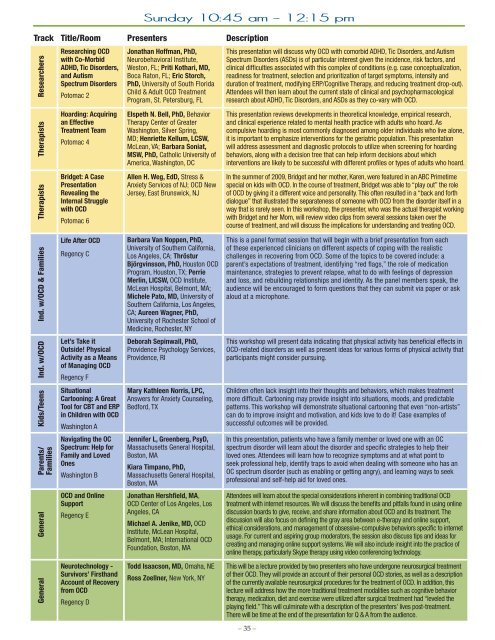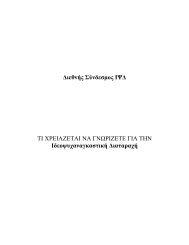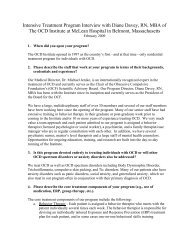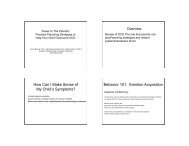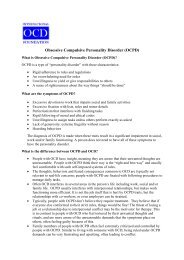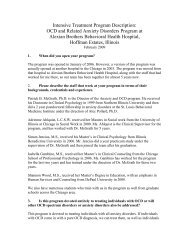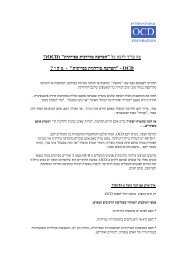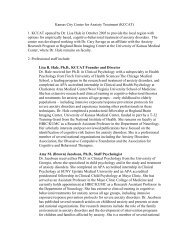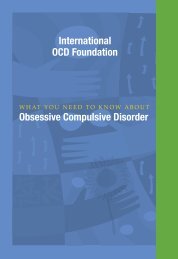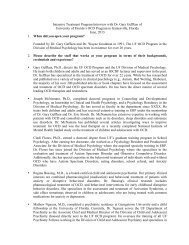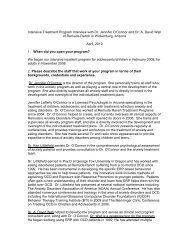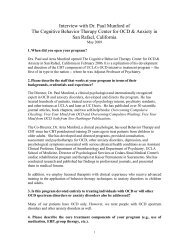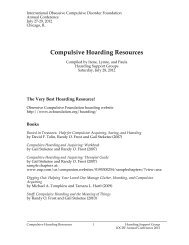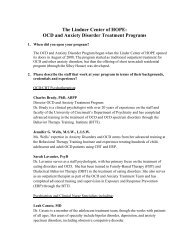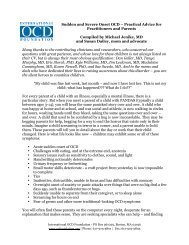Friday 8:00 am â 9:00 am - Obsessive Compulsive Foundation
Friday 8:00 am â 9:00 am - Obsessive Compulsive Foundation
Friday 8:00 am â 9:00 am - Obsessive Compulsive Foundation
You also want an ePaper? Increase the reach of your titles
YUMPU automatically turns print PDFs into web optimized ePapers that Google loves.
Sunday 10:45 <strong>am</strong> – 12:15 pmTrack Title/Room Presenters DescriptionResearchersResearching OCDwith Co-MorbidADHD, Tic Disorders,and AutismSpectrum DisordersPotomac 2Jonathan Hoffman, PhD,Neurobehavioral Institute,Weston, FL; Priti Kothari, MD,Boca Raton, FL; Eric Storch,PhD, University of South FloridaChild & Adult OCD TreatmentProgr<strong>am</strong>, St. Petersburg, FLThis presentation will discuss why OCD with comorbid ADHD, Tic Disorders, and AutismSpectrum Disorders (ASDs) is of particular interest given the incidence, risk factors, andclinical difficulties associated with this complex of conditions (e.g. case conceptualization,readiness for treatment, selection and prioritization of target symptoms, intensity andduration of treatment, modifying ERP/Cognitive Therapy, and reducing treatment drop-out).Attendees will then learn about the current state of clinical and psychopharmacologicalresearch about ADHD, Tic Disorders, and ASDs as they co-vary with OCD.TherapistsHoarding: Acquiringan EffectiveTreatment Te<strong>am</strong>Potomac 4Elspeth N. Bell, PhD, BehaviorTherapy Center of GreaterWashington, Silver Spring,MD; Henriette Kellum, LCSW,McLean, VA; Barbara Soniat,MSW, PhD, Catholic University ofAmerica, Washington, DCThis presentation reviews developments in theoretical knowledge, empirical research,and clinical experience related to mental health practice with adults who hoard. Ascompulsive hoarding is most commonly diagnosed <strong>am</strong>ong older individuals who live alone,it is important to emphasize interventions for the geriatric population. This presentationwill address assessment and diagnostic protocols to utilize when screening for hoardingbehaviors, along with a decision tree that can help inform decisions about whichinterventions are likely to be successful with different profiles or types of adults who hoard.TherapistsBridget: A CasePresentationRevealing theInternal Strugglewith OCDPotomac 6Allen H. Weg, EdD, Stress &Anxiety Services of NJ; OCD NewJersey, East Brunswick, NJIn the summer of 2<strong>00</strong>9, Bridget and her mother, Karen, were featured in an ABC Primetimespecial on kids with OCD. In the course of treatment, Bridget was able to “play out” the roleof OCD by giving it a different voice and personality. This often resulted in a “back and forthdialogue” that illustrated the separateness of someone with OCD from the disorder itself in away that is rarely seen. In this workshop, the presenter, who was the actual therapist workingwith Bridget and her Mom, will review video clips from several sessions taken over thecourse of treatment, and will discuss the implications for understanding and treating OCD.Ind. w/OCD & F<strong>am</strong>iliesLife After OCDRegency CBarbara Van Noppen, PhD,University of Southern California,Los Angeles, CA; ThrösturBjörgvinsson, PhD, Houston OCDProgr<strong>am</strong>, Houston, TX; PerrieMerlin, LICSW, OCD Institute,McLean Hospital, Belmont, MA;Michele Pato, MD, University ofSouthern California, Los Angeles,CA; Aureen Wagner, PhD,University of Rochester School ofMedicine, Rochester, NYThis is a panel format session that will begin with a brief presentation from eachof these experienced clinicians on different aspects of coping with the realisticchallenges in recovering from OCD. Some of the topics to be covered include: aparent’s expectations of treatment, identifying “red flags,” the role of medicationmaintenance, strategies to prevent relapse, what to do with feelings of depressionand loss, and rebuilding relationships and identity. As the panel members speak, theaudience will be encouraged to form questions that they can submit via paper or askaloud at a microphone.Ind. w/OCDLet’s Take itOutside! PhysicalActivity as a Meansof Managing OCDRegency FDeborah Sepinwall, PhD,Providence Psychology Services,Providence, RIThis workshop will present data indicating that physical activity has beneficial effects inOCD-related disorders as well as present ideas for various forms of physical activity thatparticipants might consider pursuing.Kids/TeensSituationalCartooning: A GreatTool for CBT and ERPin Children with OCDWashington AMary Kathleen Norris, LPC,Answers for Anxiety Counseling,Bedford, TXChildren often lack insight into their thoughts and behaviors, which makes treatmentmore difficult. Cartooning may provide insight into situations, moods, and predictablepatterns. This workshop will demonstrate situational cartooning that even “non-artists”can do to improve insight and motivation, and kids love to do it! Case ex<strong>am</strong>ples ofsuccessful outcomes will be provided.Parents/F<strong>am</strong>iliesNavigating the OCSpectrum: Help forF<strong>am</strong>ily and LovedOnesWashington BJennifer L, Greenberg, PsyD,Massachusetts General Hospital,Boston, MAKiara Timpano, PhD,Massachusetts General Hospital,Boston, MAIn this presentation, patients who have a f<strong>am</strong>ily member or loved one with an OCspectrum disorder will learn about the disorder and specific strategies to help theirloved ones. Attendees will learn how to recognize symptoms and at what point toseek professional help, identify traps to avoid when dealing with someone who has anOC spectrum disorder (such as enabling or getting angry), and learning ways to seekprofessional and self-help aid for loved ones.GeneralOCD and OnlineSupportRegency EJonathan Hershfield, MA,OCD Center of Los Angeles, LosAngeles, CAMichael A. Jenike, MD, OCDInstitute, McLean Hospital,Belmont, MA; International OCD<strong>Foundation</strong>, Boston, MAAttendees will learn about the special considerations inherent in combining traditional OCDtreatment with internet resources. We will discuss the benefits and pitfalls found in using onlinediscussion boards to give, receive, and share information about OCD and its treatment. Thediscussion will also focus on defining the gray area between e-therapy and online support,ethical considerations, and management of obsessive-compulsive behaviors specific to internetusage. For current and aspiring group moderators, the session also discuss tips and ideas forcreating and managing online support systems. We will also include insight into the practice ofonline therapy, particularly Skype therapy using video conferencing technology.GeneralNeurotechnology -Survivors’ FirsthandAccount of Recoveryfrom OCDRegency DTodd Isaacson, MD, Omaha, NERoss Zoellner, New York, NYThis will be a lecture provided by two presenters who have undergone neurosurgical treatmentof their OCD. They will provide an account of their personal OCD stories, as well as a descriptionof the currently available neurosurgical procedures for the treatment of OCD. In addition, thislecture will address how the more traditional treatment modalities such as cognitive behaviortherapy, medication, diet and exercise were utilized after surgical treatment had “leveled theplaying field.” This will culminate with a description of the presenters’ lives post-treatment.There will be time at the end of the presentation for Q & A from the audience.– 35 –


